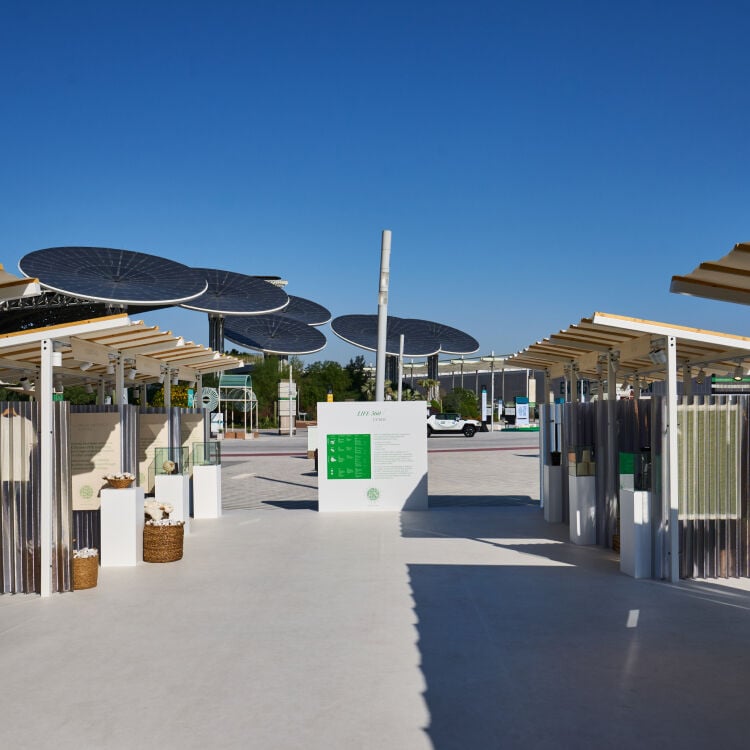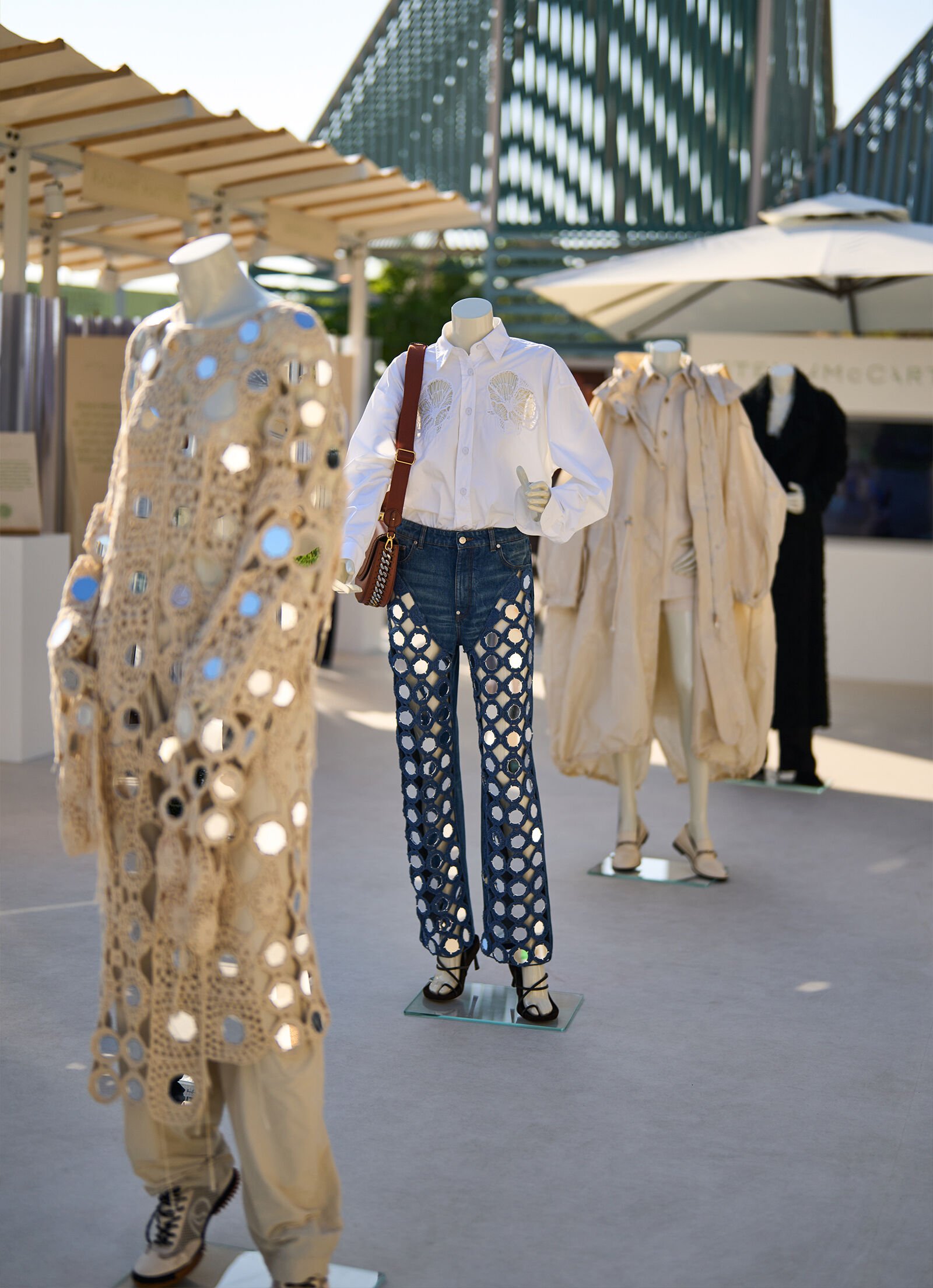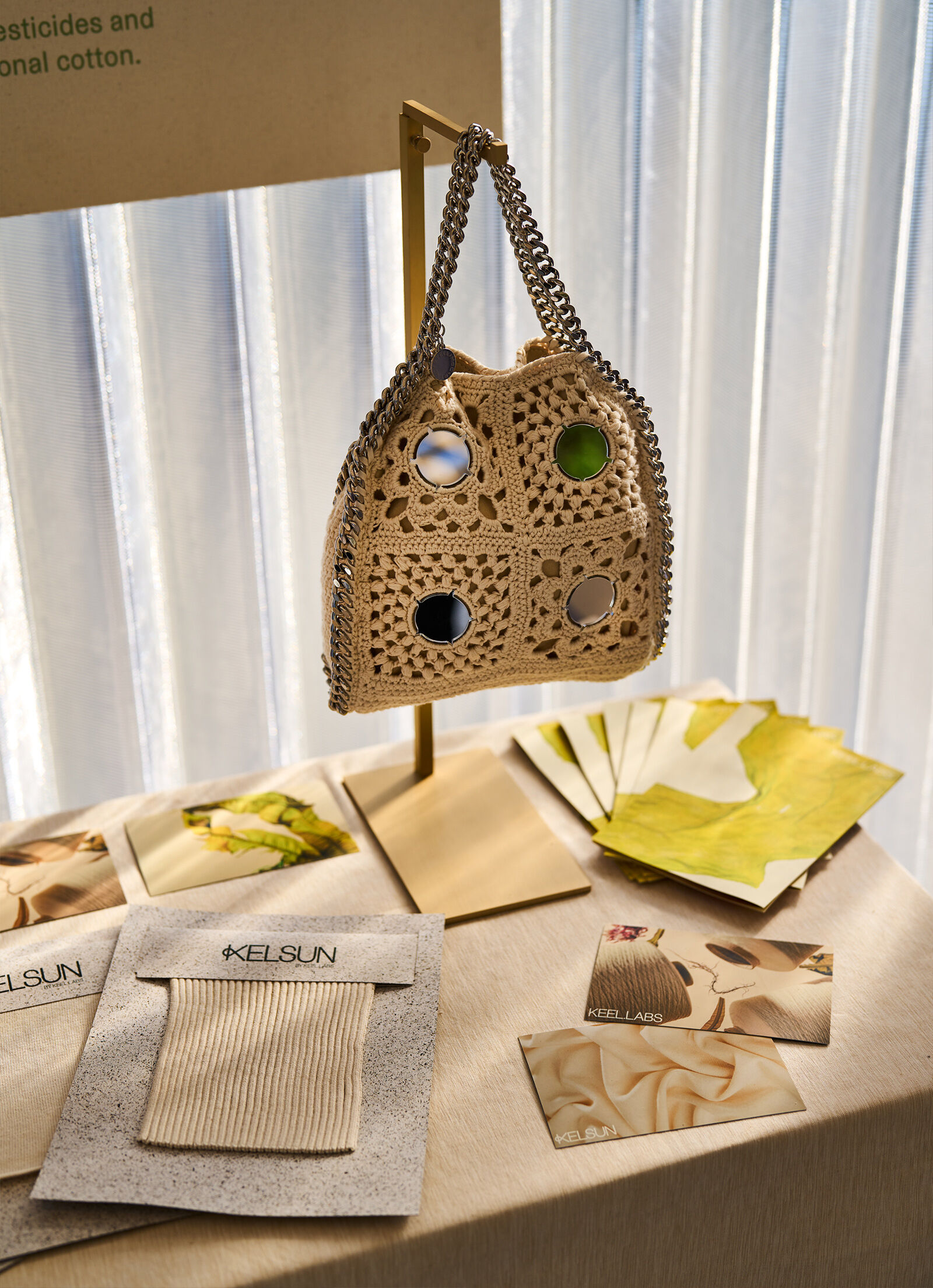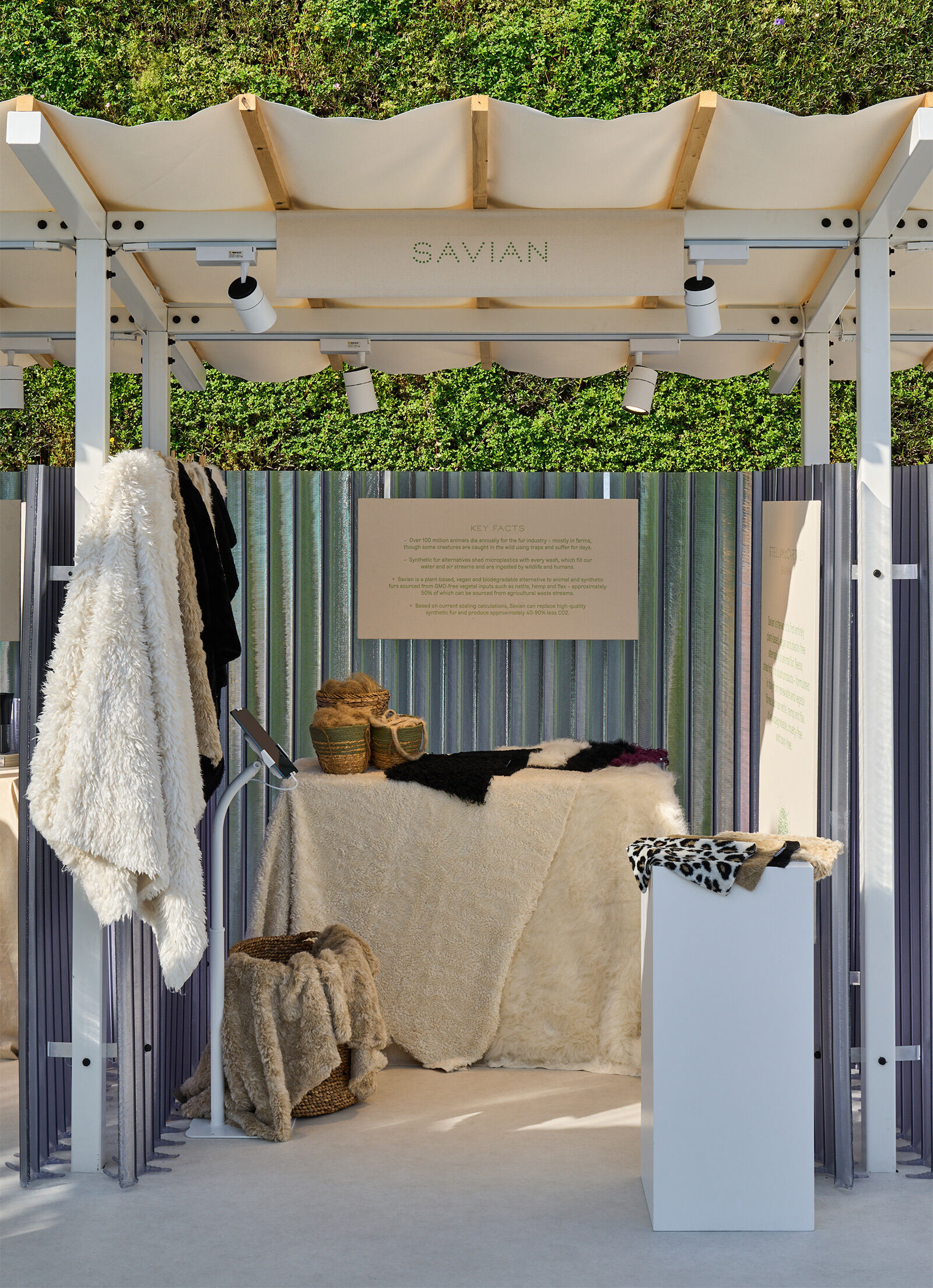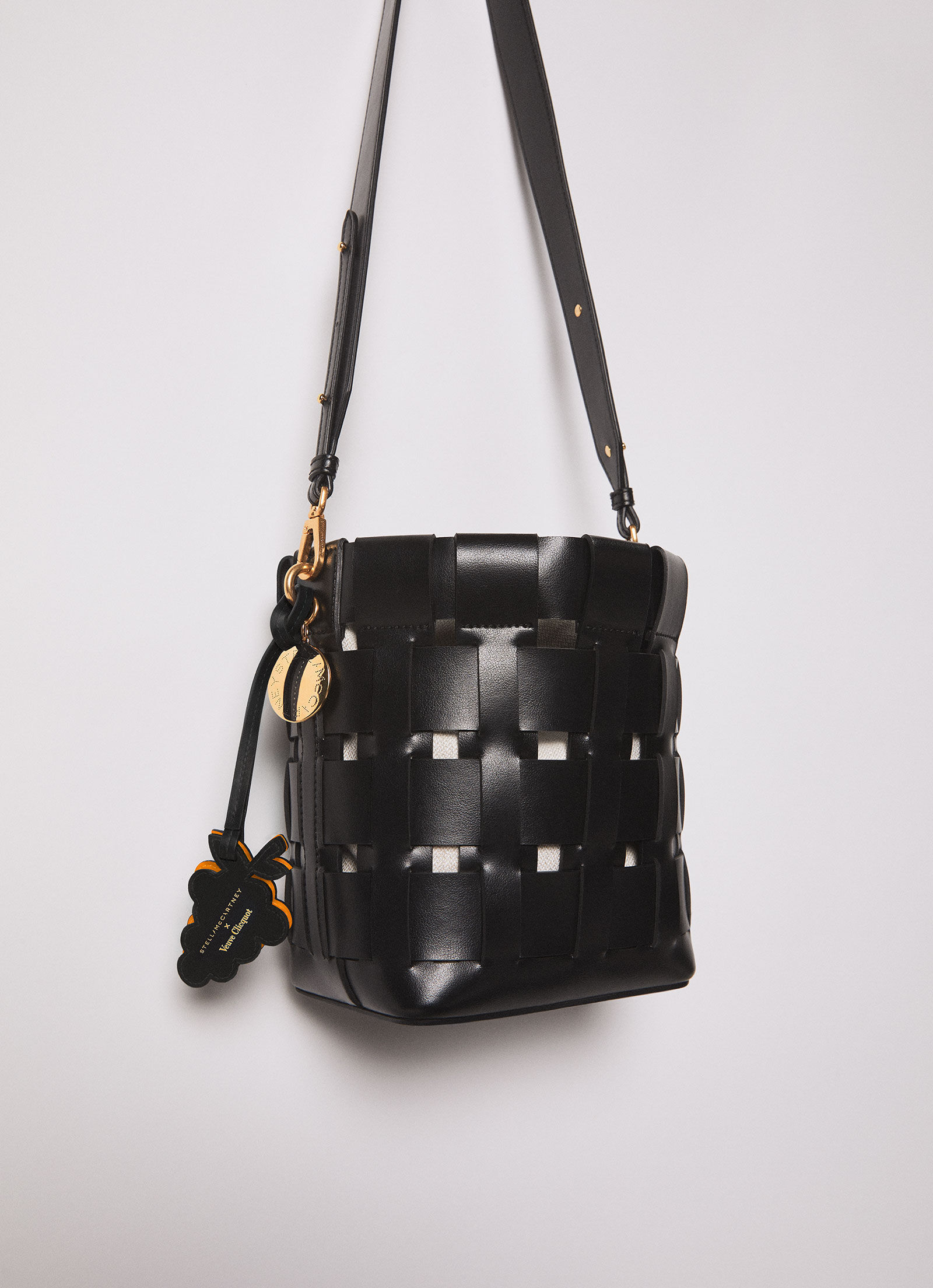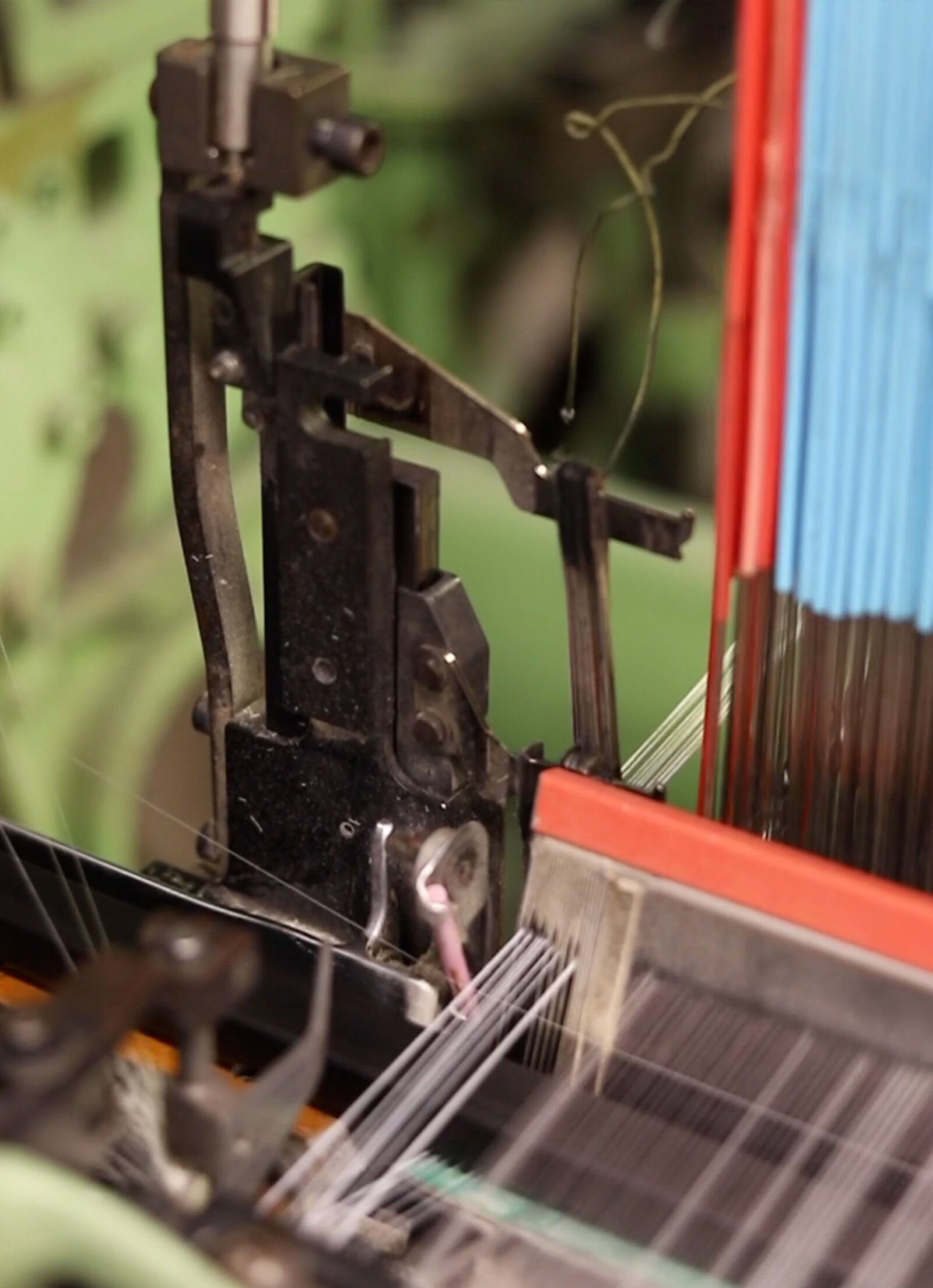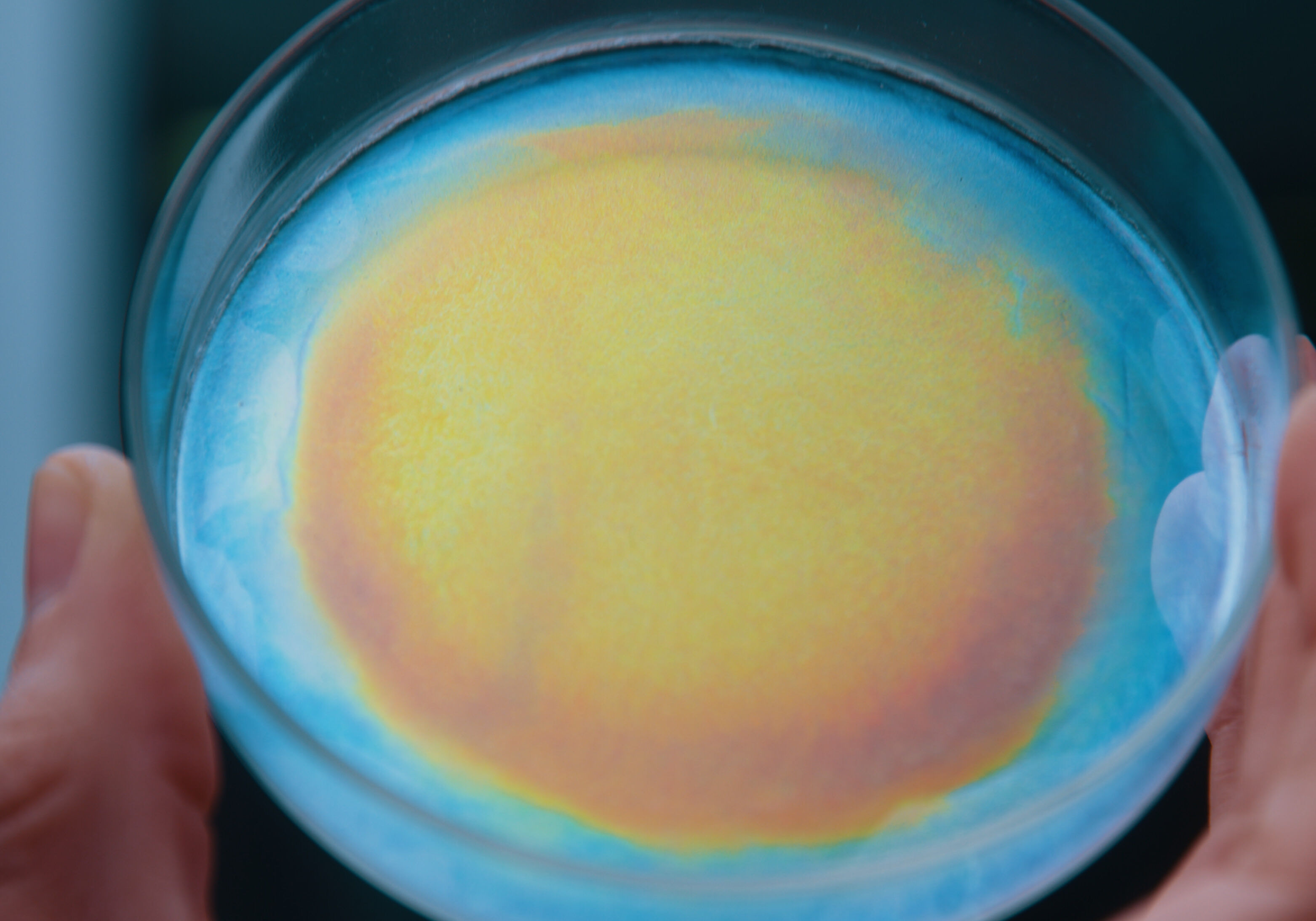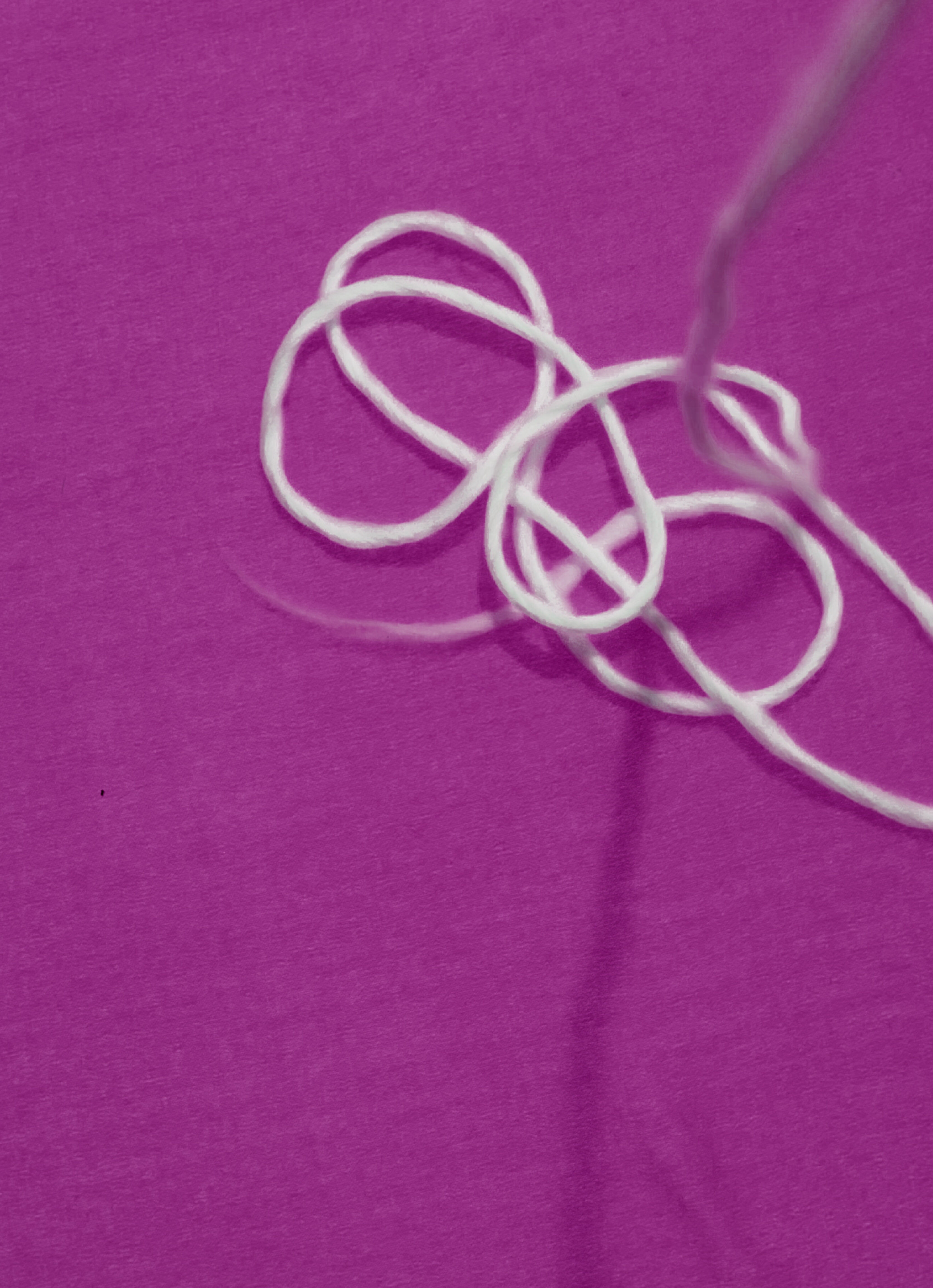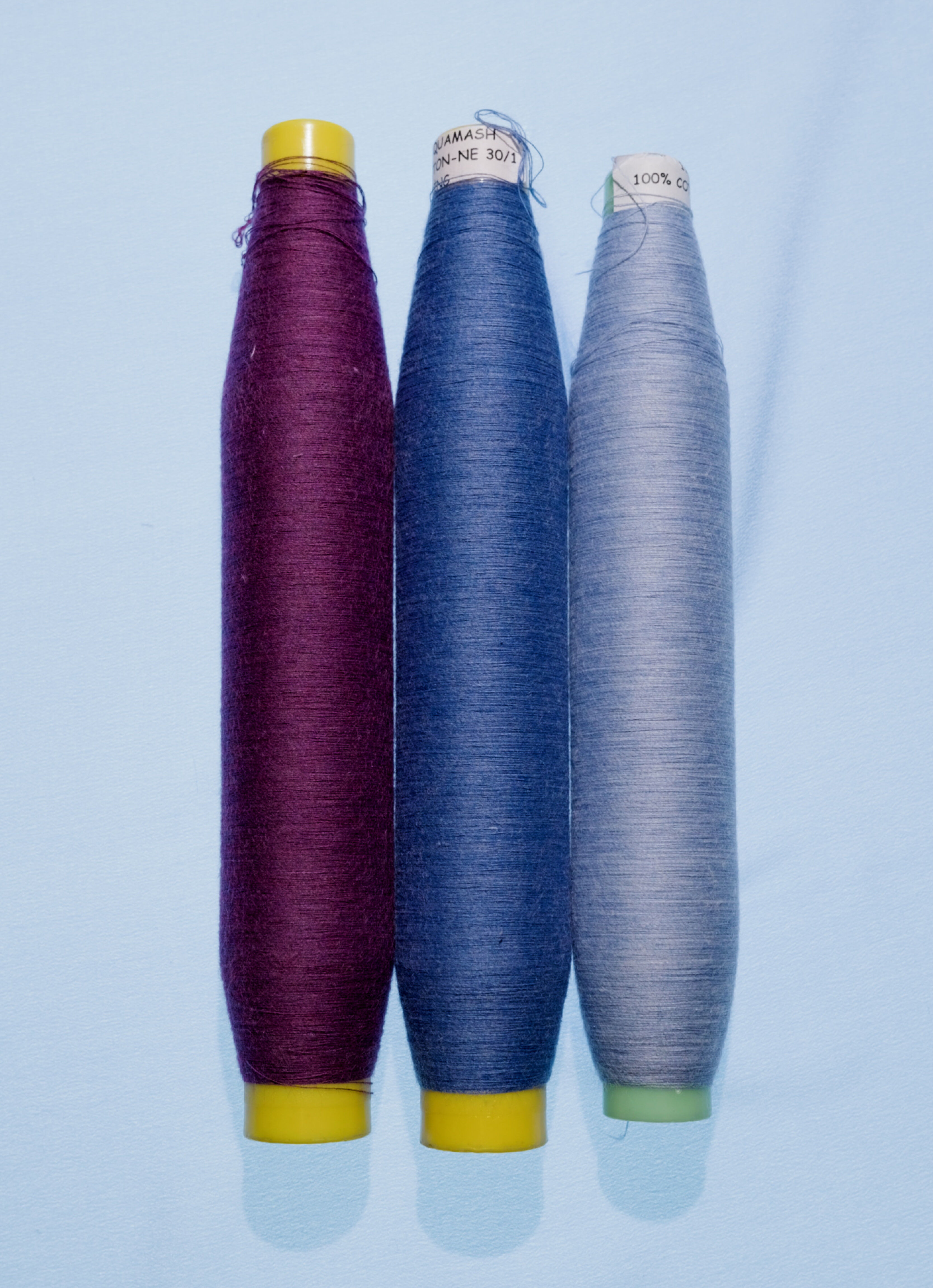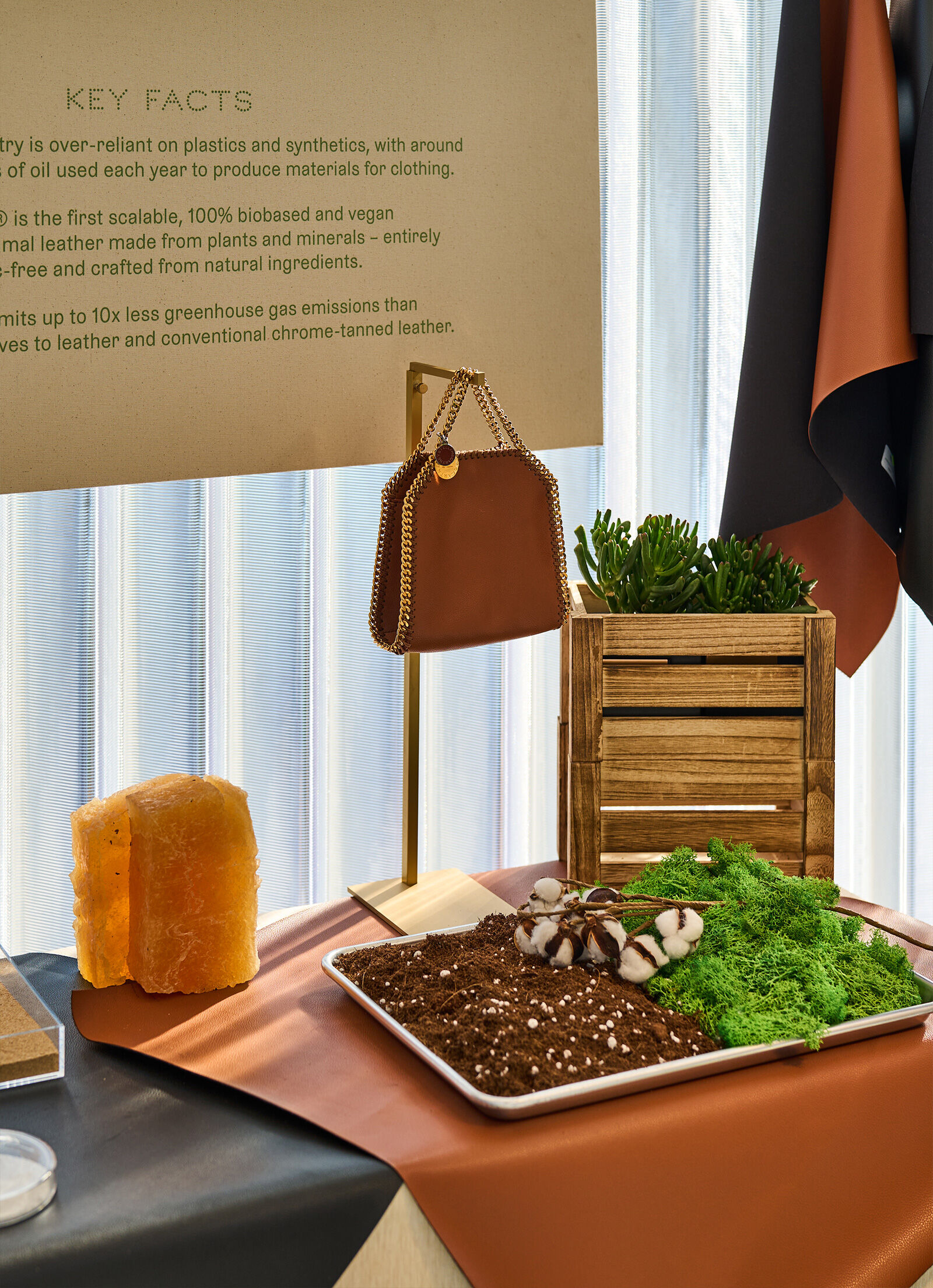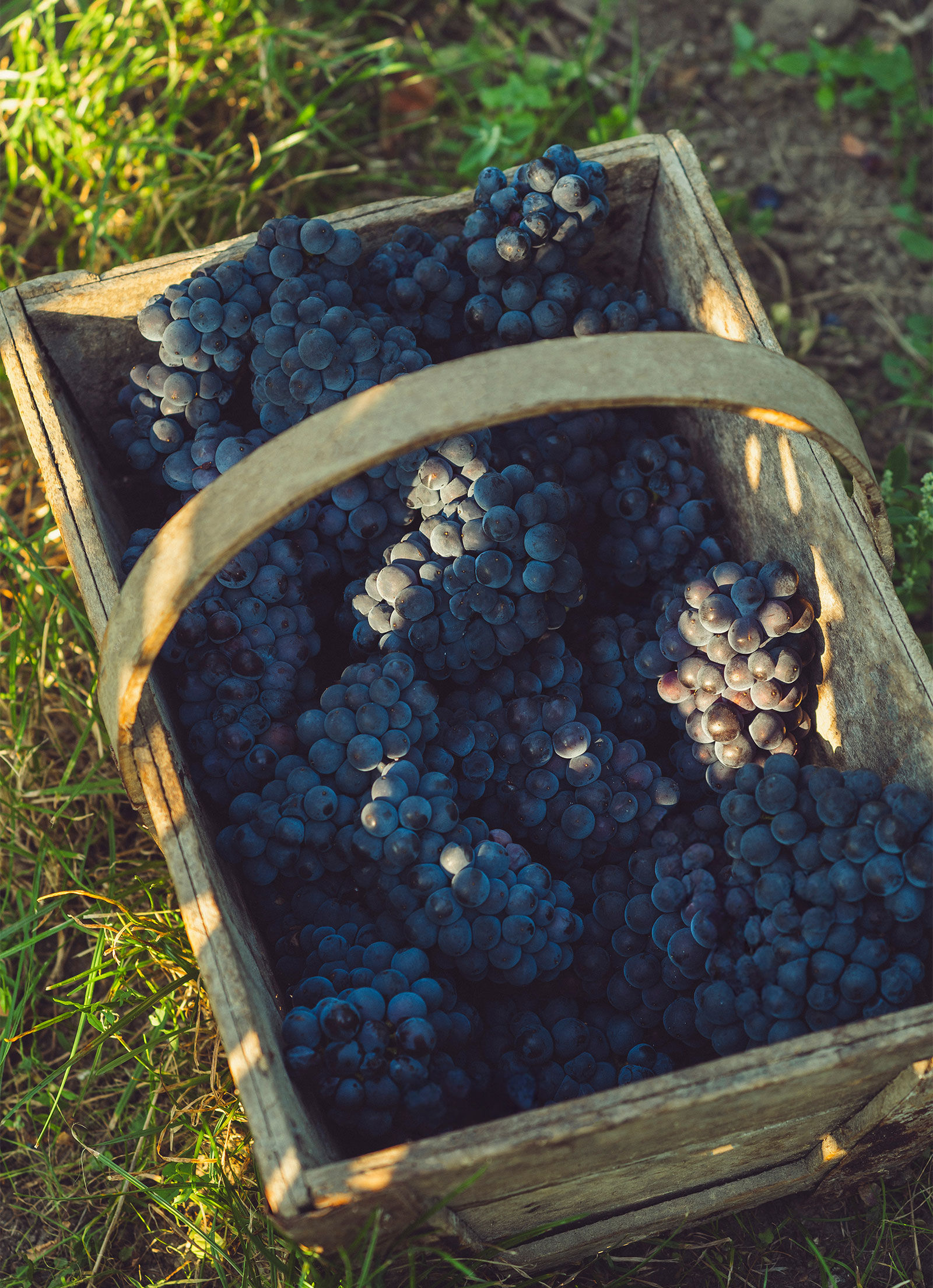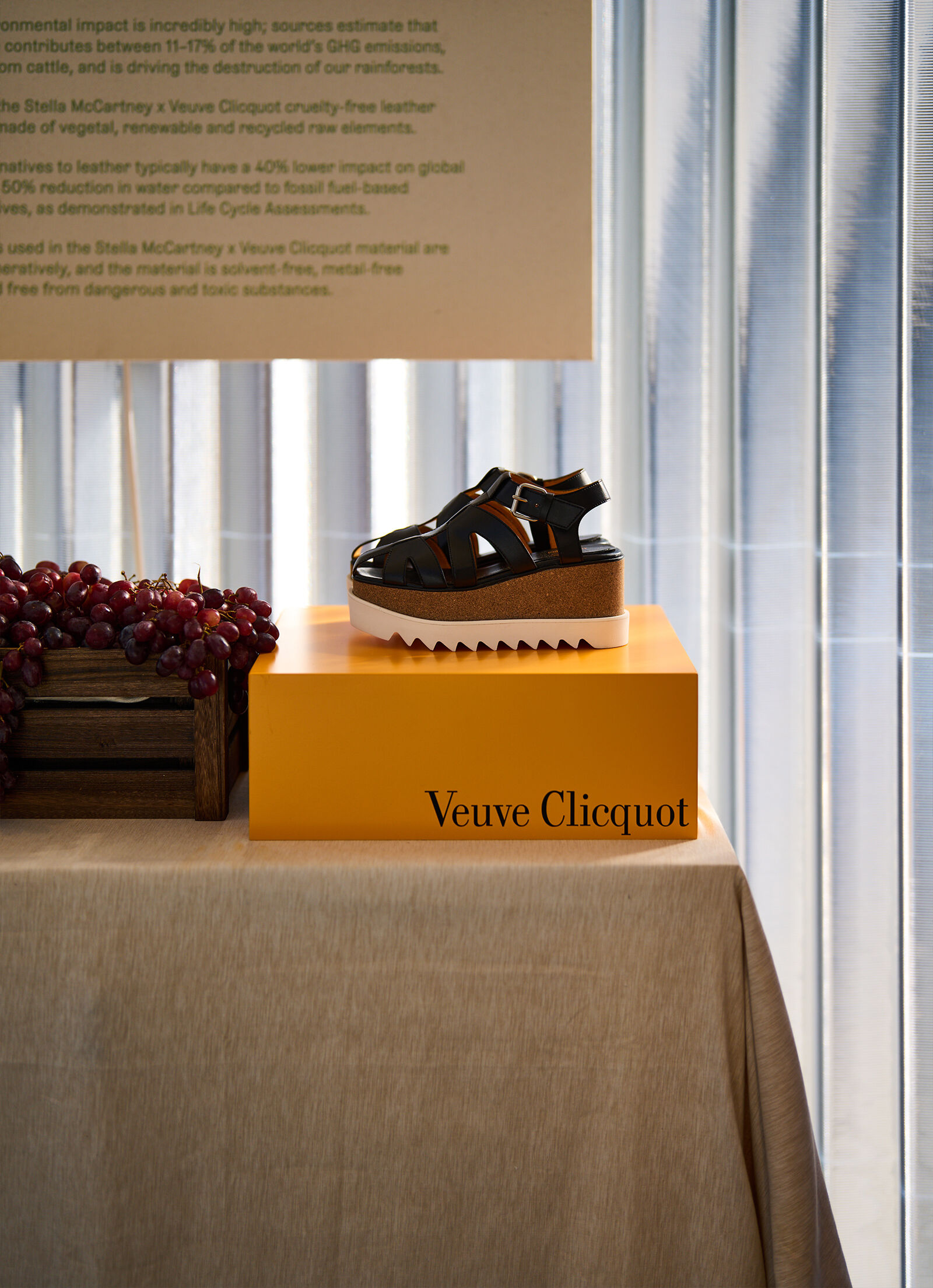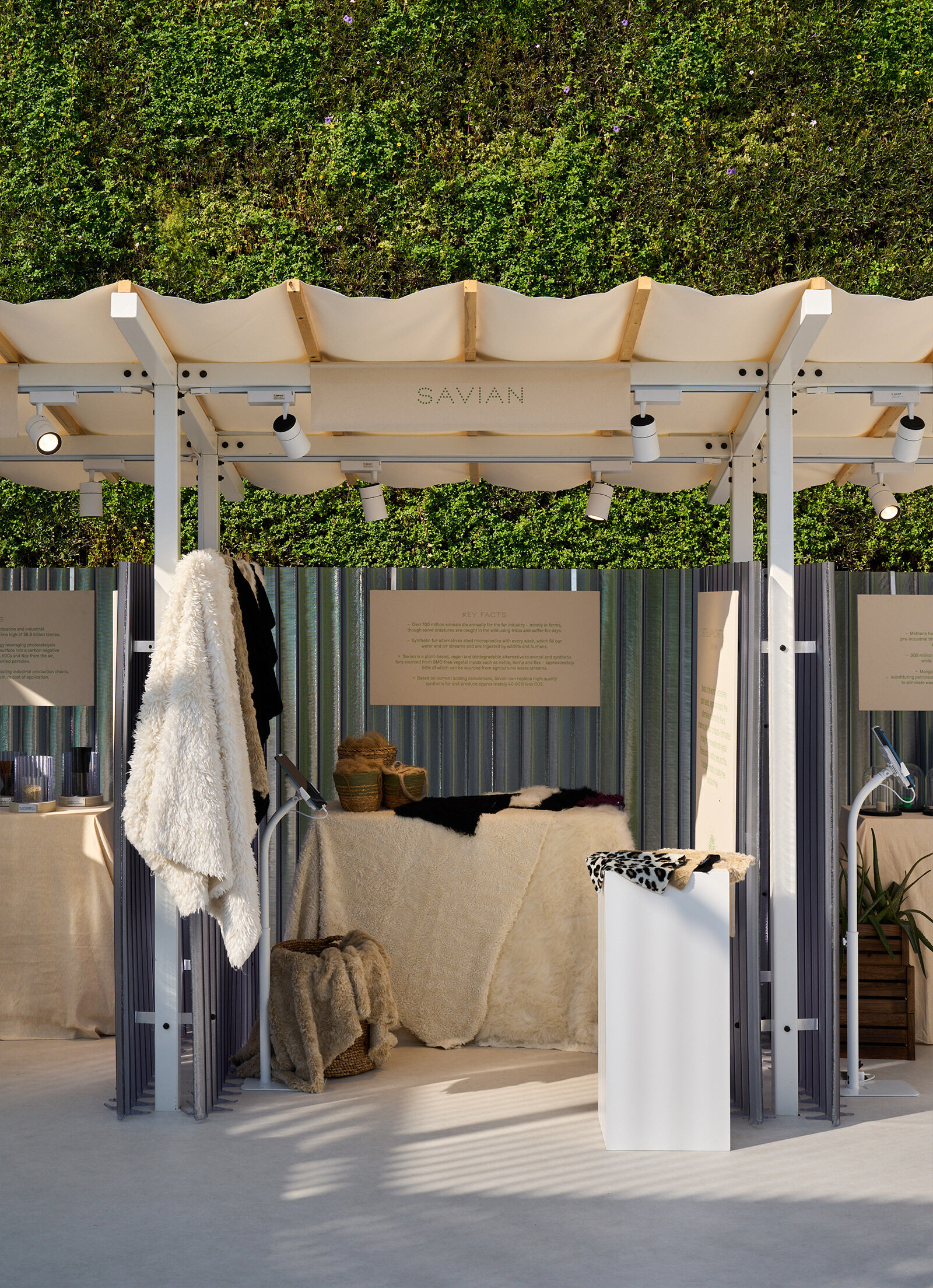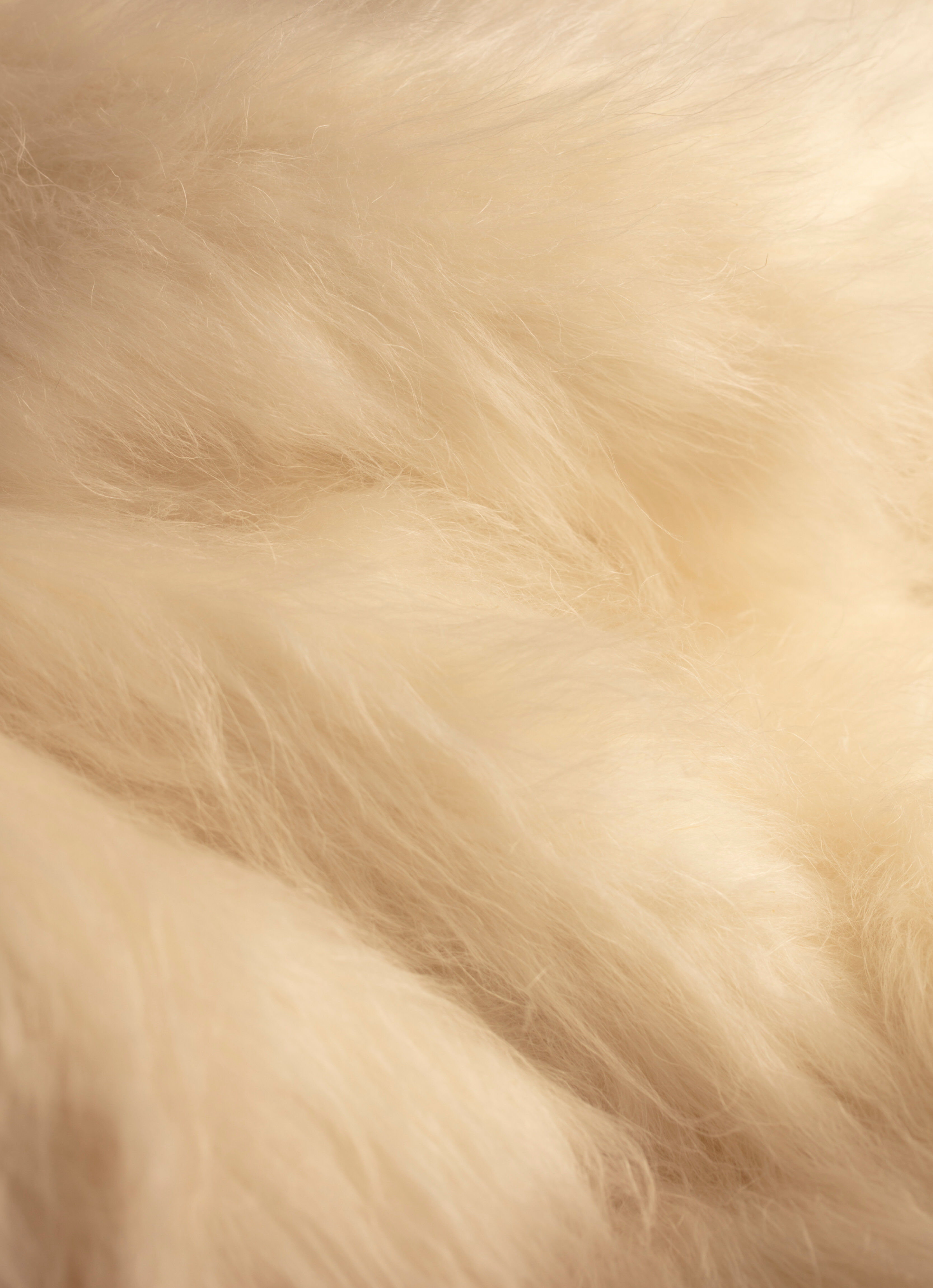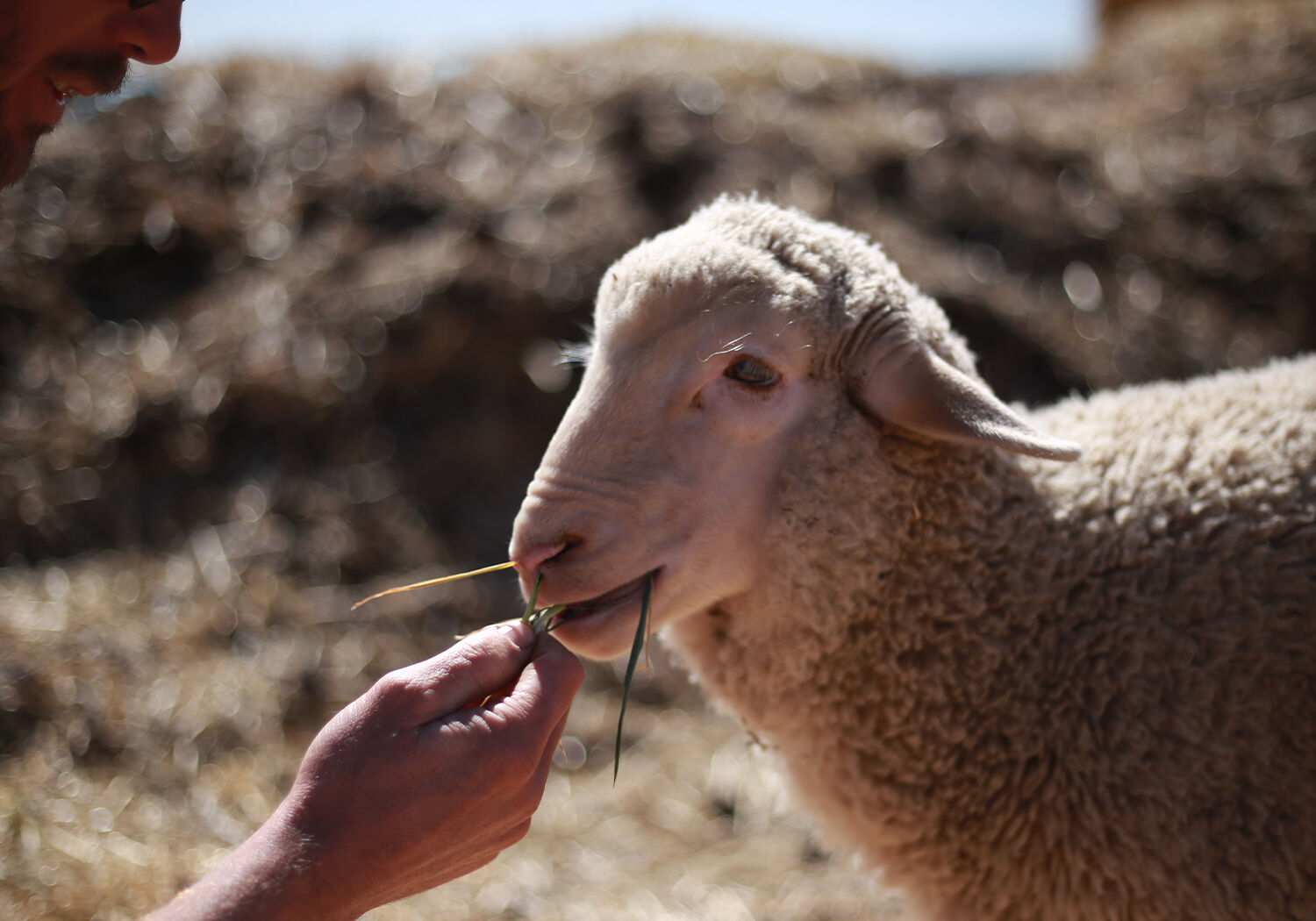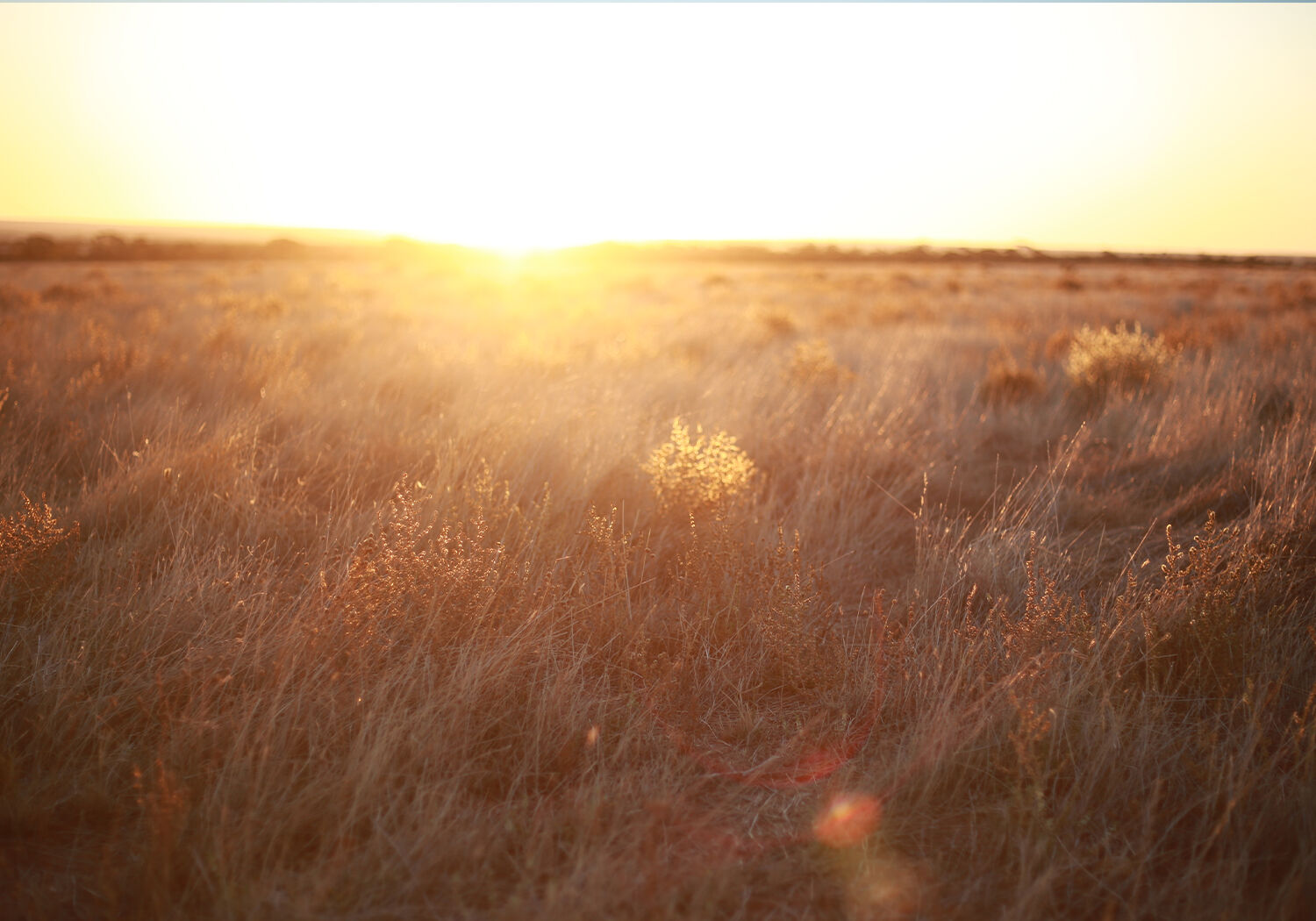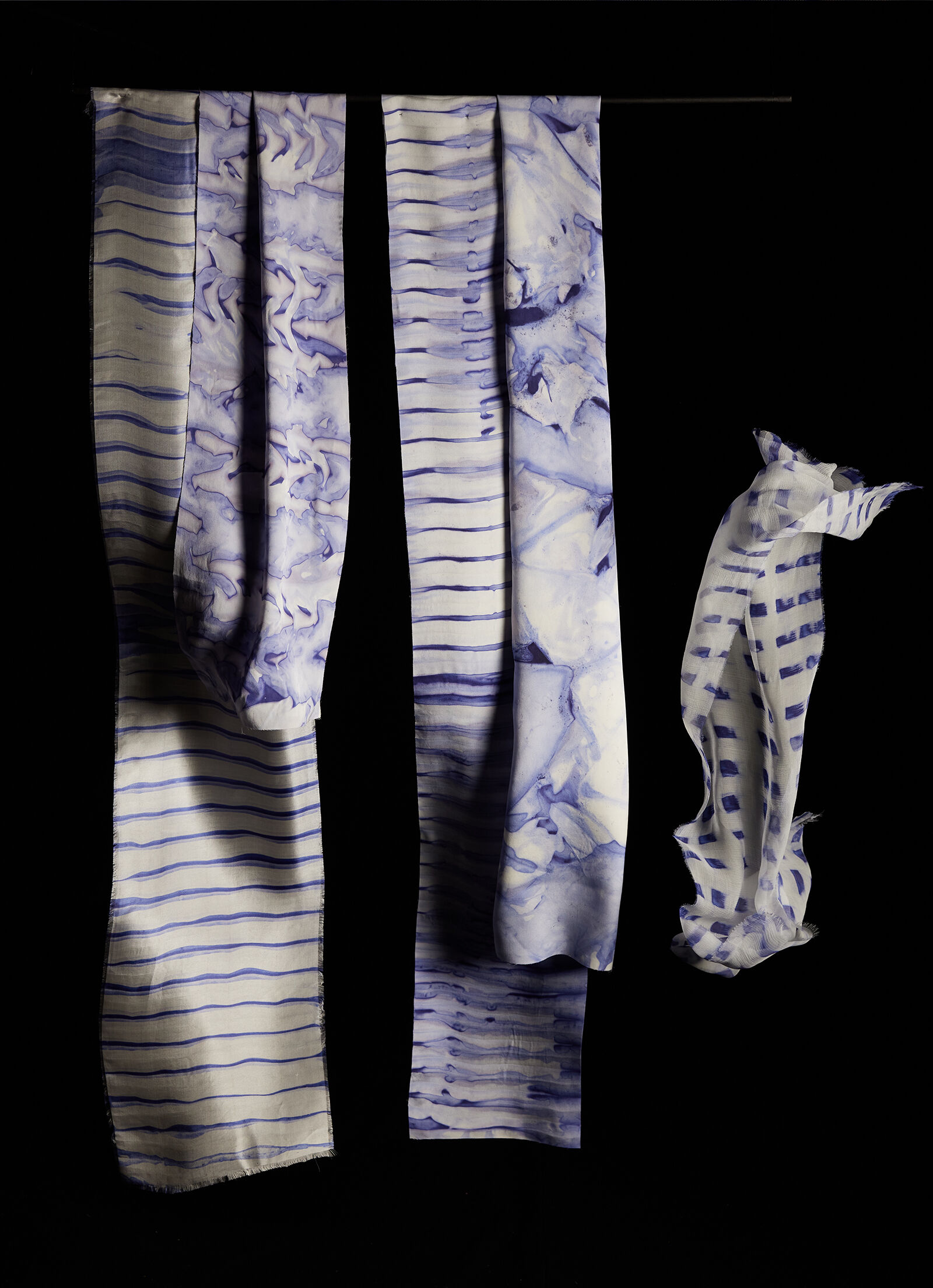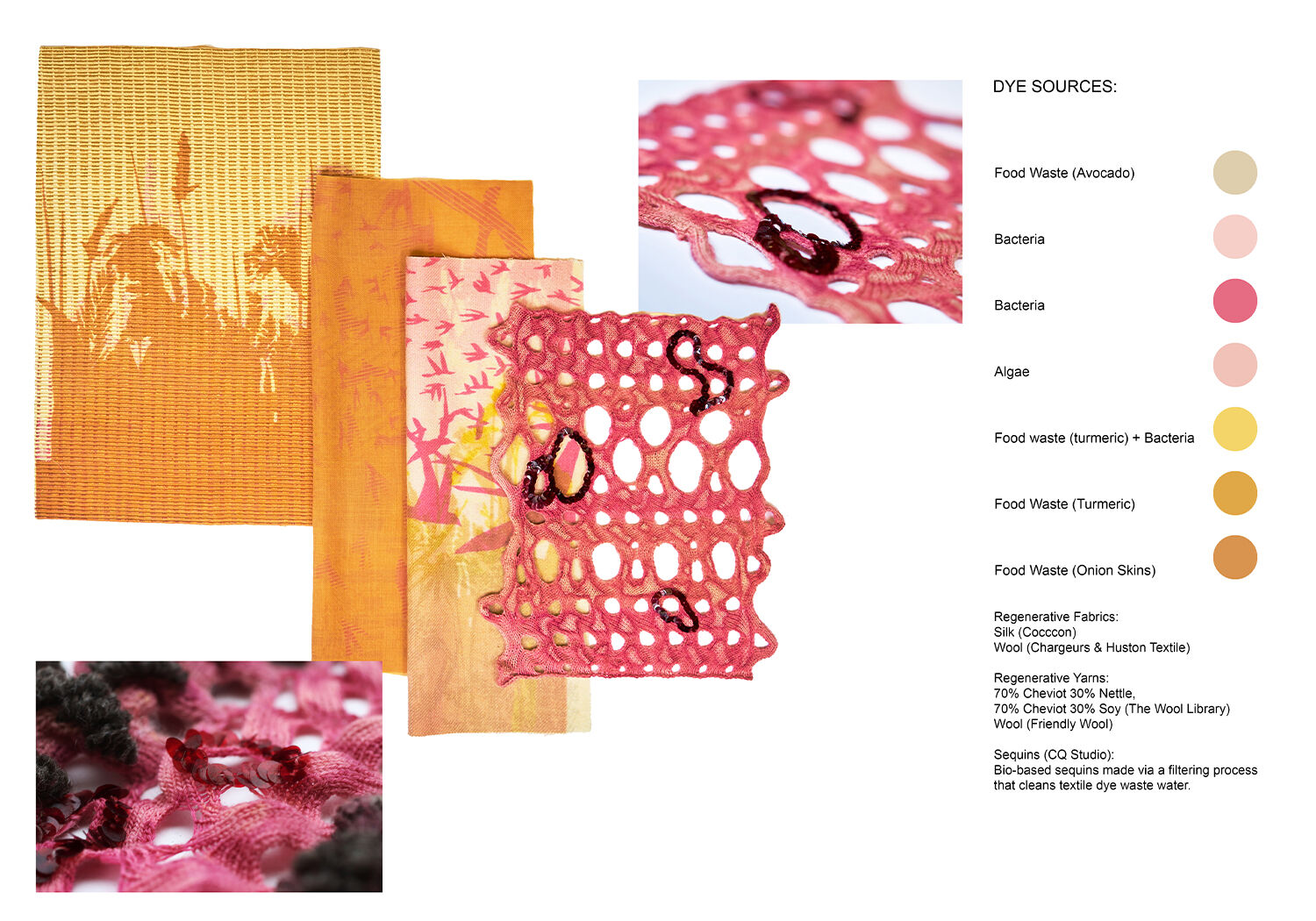COP28: Stella McCartney’s Sustainable Market and Charting a Path Foward
Join us on a journey into a nature-positive future at COP28, charting a better path forward for the fashion industry and beyond. We have launched a sustainable innovation exhibit during the COP28 UN Climate Conference – titled Stella McCartney’s Sustainable Market: Innovating Tomorrow’s Solutions, running 30 November to 12 December.
Stella has been a trailblazer in sustainability and environmentally conscious fashion for over two decades, launching the world’s first luxury house to never use animal leather, feathers, fur or skins and adopting extensive sustainability principles following the Livestock's Long Shadow Report in 2006, which correlated animal agriculture with climate harms.
Since then, Stella has led as fashion’s conscience through a range of efforts: investing in cruelty-free alternatives, material and process innovations, strategic partnerships across industries, regenerative and nature-restoring practices, circular ambitions, transparency around impacts and communities, and far beyond. Looking ahead and to maintain our leadership in this space, we unveil new announcements and commitments at COP28:
- Release of our 2023 Impact Report
- Renewed commitments to innovation and fossil fuel reduction across materials and processes throughout the production, sale and end of life of all Stella McCartney products
- Strategic partnerships with Mango Materials and Air Carbon to develop new innovations and materials from GHG emissions
- Upcoming 2024 Circular Design Guide to openly share sustainable circular design and materials knowledge, principles and guidelines across industries
- Launching a new innovation campaign with PETA to emphasise alternative and innovative materials for leathers, furs, feathers and fills
Stella’s Delegation
Representing the fashion industry at COP28, Stella’s delegation will be focused on three key goals: advocating for policy and regulatory change to incentivise sustainable business and the decarbonisation of the industry; continuing a decades-long mission built around human and animal protection and welfare; and building a coalition of global government and business leaders to support and scale investment in a wide range of material and process innovations.
The fashion industry is estimated to be responsible for up to 8% of global greenhouse gas (GHG) emissions. Adding to the challenge of reducing its GHG footprint is the expectation that the industry will continue to grow as a result of increased population and consumption patterns. The responsibility is on fashion brands, in collaboration with private and public leaders, to increase the speed of decarbonisation.
Stella McCartney’s Sustainable Market: Innovating Tomorrow’s Solutions
To inspire and educate on the possibilities of current cutting-edge or soon-to-be-available technologies, we are hosting a groundbreaking exhibition at COP28 platforming the future of material innovation – showcasing over 15 next-gen pioneers alongside breakthroughs in regenerative agriculture, bio- and plant-based alternatives to plastic, animal leather and fur, and traditional fibres. The space was 3D printed with PURE.TECH carbon-absorbing materials, actively removing harmful particles from the air. The Sustainable Market concept was launched at our Summer 2024 runway show during Paris Fashion Week, with the installation continuing to evolve and travel over the coming year.
Among the innovations being platformed at COP28 are a grape-based alternative innovated in partnership with Veuve Clicquot, using the harvest by-product from the champagne Maison’s historic vineyard in Reims, France – grown regeneratively on land bought by Madame Clicquot herself over 200 years ago. We have also collaborated with Protein Evolution on the world’s first garment crafted from biologically recycled, infinitely recycled polyester, made using their Biopure™️ technology.
A Renewed Commitment to Increasing Innovation and Reducing Impact
In addition to advocating and collaborating to transform the fashion industry, Stella McCartney will continue to lead with bold sustainability ambitions – including a 2040 net-zero target. This includes cutting emissions across its supply chain by 46.2% by 2030 and developing projects that support supply chain partners, innovators and global communities in their climate-resilient journeys.
We are continuing to develop low-carbon solutions and invest in nature-based regenerative agriculture projects with carbon benefits that restore and protect natural ecosystems, and enhance the livelihoods of global communities. This includes its continued partnership with the SOKTAS regenerative agricultural programme in Turkey, in collaboration with LVMH and the UNECE.
In addition to these efforts, Stella McCartney proudly supports the development and scaling of the next generation of innovative materials and processes through SOS Fund, a $200M sustainable investment fund she co-founded with Collaborative Fund – with five start-ups in its roster at the CO28 Sustainable Market:
- NFW and Mirum
- Mango Materials
- Keel Labs
- Protein Evolution
- Brimstone
The other innovators and partners exhibiting at Stella’s COP28 exhibit include:
- Stella McCartney x Veuve Clicquot
- LVMH Life 360 and Maison/0
- Radiant Matter Biomaterials
- Chargeurs Luxury Fibers/NATIVA™️ regenerative wool
- SÖKTAŞ regenerative cotton
- Savian plant-based fur alternative
- PURE.TECH carbon-negative applications
Discover more about the innovators featured in Stella McCartney’s Sustainable Market: Innovating Tomorrow’s Solutions below.
Protein Evolution
Protein Evolution is making polyester infinitely recyclable. Through the use of enzymes, the company’s Biopure™ technology transforms everything from waste plastic bottles to unwanted clothing into the building blocks of good-as-new polyester, which are indistinguishable from the petroleum-derived precursors used in production today.
Plastic production results in over 1.6 billion tons of greenhouse-gas emissions each year, with an estimated 91% of plastic produced not recycled – instead entering landfills, incinerators or missing the collection system altogether. Producing plastic-based textiles uses an estimated 342 million barrels of oil every year, with polyester accounting for 80% of these synthetic fibres.
Protein Evolution is helping to eliminate plastic waste, and reduce the industry’s reliance on fossil fuels, through a biological recycling process pairing enzymes and AI to break down polyester and other synthetic fibres.
Keel Labs
Keel Labs has innovated Kelsun™️, a seaweed-based alternative to cotton and synthetic fibres crafted from naturally renewable, regenerative kelp. This pioneering material is formed from an abundant polymer found in seaweed, producing a fibre that is fossil fuel-free and compostable. We debuted the material in two styles: a jumper and a dress, each walking the runway as part of our Summer 2024 collection.
Up to 500,000 tonnes of microplastics from textiles enter global marine environments annually, while conventional cotton production uses 2.5% of the world’s arable land, accounting for 16% of all pesticide use. These toxic chemicals put people, animals and ecosystems at risk.
Kelsun™️ is highly compostable in 61 days, increases ecosystem health and leverages seaweed as a raw material – which absorbs carbon from the atmosphere. Plus, it uses 70x less water alongside 100% less pesticides and agricultural land compared to conventional cotton.
Radiant Matter
Radiant Matter engineers bio-inspired and structurally coloured materials for the circular economy. Their innovations – including BioSequins, which Stella McCartney made world-first garments with – are non-toxic, biodegradable and low carbon, without the use of plastics, metals, minerals or pigments.
Conventional sequins are made of polyester film (Mylar) or vinyl (PVC), which involve toxic and carcinogenic chemicals that cause significant environmental and health risks. British women purchase 33 million sequinned garments every festive season, with 1.7 million ending up in landfill after only 5 years (Oxfam) and 35% of microplastics being released into the world’s oceans (EEA).
BioSequins offer a plastic-free, biodegradable and non-toxic alternative sparkle, using no metals, minerals or synthetic pigments or colourants.
Brimstone
Brimstone has innovated a carbon-negative process to make cement, using calcium silicate rock. It also produces magnesium-based materials that naturally absorb carbon from the atmosphere, helping to actively fight climate change. For COP28, we showcased a sculpture of Stella McCartney made from Brimstone, illustrating both the raw material and product.
Cement production accounts for 7.5% of global CO2 emissions; if this was a country, it would be the third-largest emitter on Earth.
Brimstone is the only company making traditional cement without emissions, using calcium silicate instead of carbon-heavy limestone, which releases CO2 when processed.
Mango Materials
Mango Materials transforms methane into a biodegradable alternative to plastic. Its scalable process harnesses the carbon-storing capabilities of bacteria to form a PHA biopolymer, this can then be innovated into pellets which are easily integrated into conventional plastic supply chains. Stella McCartney has collaborated with Mango Materials to produce eyewear, in partnership with Thelios.
Methane has accounted for roughly 30% of global warming since pre-industrial times; over a 20-year period, methane is 80x more potent at warming compared to carbon dioxide. Alongside this, 300 million tonnes of polluting plastics are thrown away globally and only 9% of global plastic pollution is recycled.
Mango Materials can directly displace polluting plastics – substituting petroleum-based, polluting plastics with its pioneering circular materials to eliminate waste and sequester 1.8 gigatonnes of CO2e in the process.
PURE.TECH
PURE.TECH is a group of product applications, derived from nature-based materials, that are able to adsorb greenhouse gasses from the atmosphere. Applicable across textiles, paint, paper, wood and plastic, it transforms ordinary objects into carbon-negative forces – that’s why Stella McCartney has partnered with PURE.TECH to 3D print our COP28 installation.
Global CO2 emissions from energy combustion and industrial processes grew by 0.9% in 2022, reaching an all-time high of 36.8 billion tonnes.
PURE.TECH’s advanced material technology leverages photocatalysis and catalysis processes to transform almost any surface into a carbon negative force – removing harmful pollutants such CO2, VOCs and Nox from the air, and converting them into safe, inherited particles. It thereby offers a scalable solution, compatible with existing industrial production chains, without increasing timings and with a competitive cost of application.
MIRUM by NFW
NFW have innovated MIRUM®, a world-first all-natural and plastic-free vegan alternative to animal leather crafted from vegetal and mineral ingredients. The next-gen material is durable, versatile and fully circular, capable of being re-engineered into new materials or safely returned to the planet as nutrients.
The fashion industry is over-reliant on plastics and synthetics, with around 342 million barrels of oil used each year to produce materials for clothing.
Emitting up to 10x less greenhouse gas emissions than synthetic alternatives to leather and conventional chrome-tanned leather, MIRUM® is the first scalable, 100% biobased and vegan alternative to animal leather made from plants and minerals – entirely plastic-free and crafted from natural ingredients.
STELLA MCCARTNEY X VEUVE CLICQUOT
Stella McCartney and Veuve Clicquot have collaborated on a pioneering grape-based alternative to animal leather, made using the by-product from Veuve Clicquot’s harvest. Traceable back to Veuve Clicquot’s historical vineyard, the grapes are grown using regenerative practices – helping to restore local biodiversity, soil health and sequester carbon.
Leather’s environmental impact is incredibly high; sources estimate that animal agriculture contributes between 11-17% of the world's GHG emissions, 65% of which is from cattle, and is driving the destruction of our rainforests. About 80% of the Stella McCartney x Veuve Clicquot cruelty-free leather alternative is made of vegetal, renewable and recycled raw elements.
Grape-based alternatives to leather typically have a 40% lower impact on global warming and 50% reduction in water compared to fossil fuel-based alternatives, as demonstrated in Life Cycle Assessments. Alongside this, the grape stems used are grown regeneratively and the material is solvent-free, metal-free as well as free from dangerous, toxic substances.
Savian
Savian is the world’s first entirely plant-based, vegan and plastic-free alternative to animal fur, fleece, shearling and plush products. Formulated in Italy from renewable and vegetal fibres such as nettle, hemp and flax, it is biodegradable, cruelty-free and toxin-free.
Over 100 million animals die annually for the fur industry – mostly in farms, though some creatures are caught in the wild using traps, suffering for days on end. On top of this, synthetic fur alternatives shed microplastics with every wash, filling our water and air streams and being ingested by both wildlife and humans.
Savian is a plant-based, vegan and biodegradable alternative to animal and synthetic furs sourced from GMO-free vegetal inputs such as nettle, hemp and flax – approximately 50% of which can be sourced from agricultural waste streams. Based on current scaling calculations, it can replace high-quality synthetic fur and produce approximately 40-90% less CO2.
Chargeurs (NATIVA™)
NATIVA™️ wool by Chargeurs Luxury Fibers is sourced through regenerative farming practices that increase biodiversity, regenerate topsoil, improve watersheds, enhance ecosystem services and sequester carbon.
The GHG emissions from wool production are far greater than those caused by the production of acrylic, nylon and many other synthetic materials. Traditionally, raising sheep for wool can lead to deforestation and land clearance, soil degradation and biodiversity loss, with 75% of Earth’s land degraded due to human activity such as harmful farming practices.
NATIVA™️ is sourced through regenerative farming, also referred to as ‘carbon farming’, which increases biodiversity, regenerates topsoil, improves watersheds, enhances ecosystem services and sequesters carbon. Fully traceable with blockchain technology, the NATIVA™️ certified farms source from adhere to the highest levels of animal welfare, responsible land management, environmental protection and care for farmers and local communities.
SÖKTAŞ
Stella McCartney have partnered with SÖKTAŞ since 2019, supporting their transition to regenerative agriculture for cotton production. Garments produced with SÖKTAŞ regenerative cotton can be traced through UNECE blockchain methodology.
Conventional agriculture is the single largest driver of global biodiversity loss, with conventional cotton production using 2.5% of the world’s arable land, and accounting for 16% of all pesticide use. Regenerative agriculture rebuilds degraded soils, enhances soil fertility, biodiversity, water efficiency and crop resilience, leading to decreased inputs, higher-quality cotton fibres and improved community livelihoods.
The SÖKTAŞ regenerative BEAM (Biologically Enhanced Agricultural Management) transition project has captured and sequestered carbon approximately 34.38 tonnes CO2/ha over the last 4 years.
LVMH MAISON ZERO
Maison/0 is the Central Saint Martins-LVMH creative platform for regenerative luxury. Their mission is to prototype emergent and disruptive design concepts that can lead to the restoration of planetary health, aligned with the LVMH LIFE 360 environment strategy. Stella McCartney is proud to showcase two of the projects it supports, at COP28.
Automating Violacein
Automating Violacein by Charlotte Werth, Maison/0 Designer in Residence 2023, explores how an automated microbial dye process can lead to the production of original one-of-a-kind printed patterns for luxury textiles – produced on Nona Source deadstock fabrics and printed with Janthinobacterium lividum, a bacteria found in soil.
Microbial research has evidenced clear environmental benefits in comparison with synthetic dyes including significant water savings, energy and chemical use reduction, biodegradability and applications across fibre types without the need for toxic mordanting.
Rewilding Textiles
Rewilding Textiles is a Maison/0 research project aiming to design a collection of printed and knitted textiles that align colouring processes with the positive impact of regenerative agriculture on biodiversity and climate. Using bacteria, algae and food waste as potential bio-circular alternative dye sources, the project hopes to replace synthetic options.
Whilst textiles grown in regenerative farming systems offer nature-positive solutions for fashion, their environmental benefit is compromised by the use of synthetic dyes. This project hopes to solve that, supported by a publication positioning the values of regenerative farming and nature-based approaches to designing textiles.
Sign up for our newsletter to discover more about Stella McCartney’s sustainable innovations and commitments.
